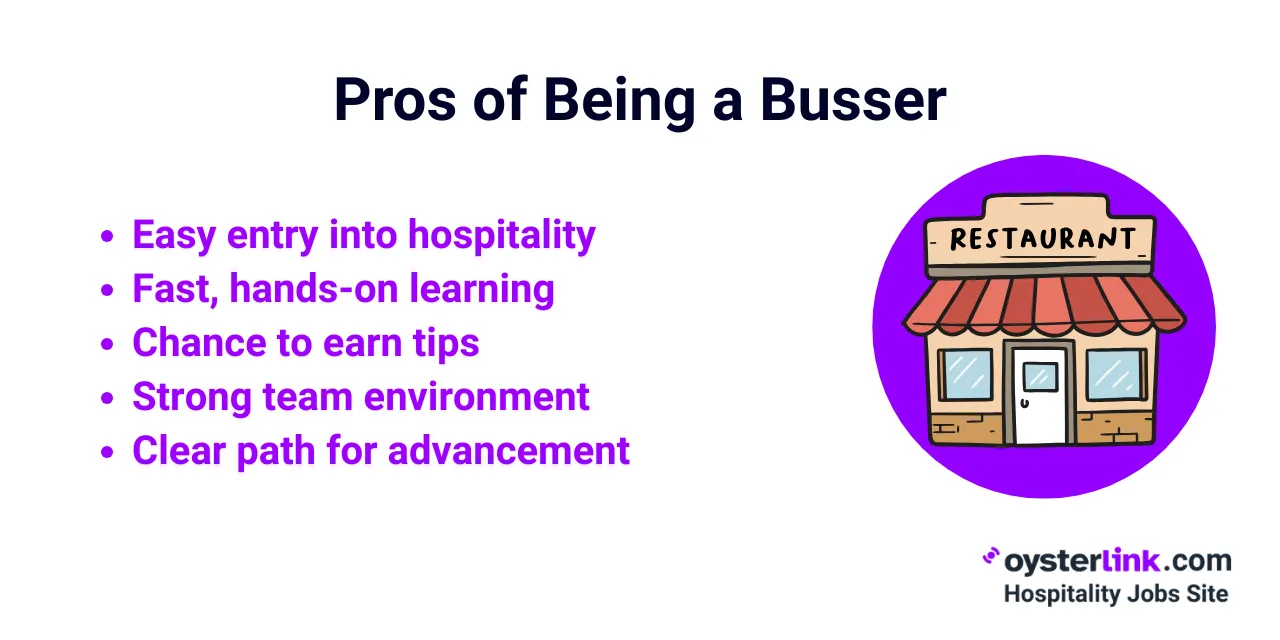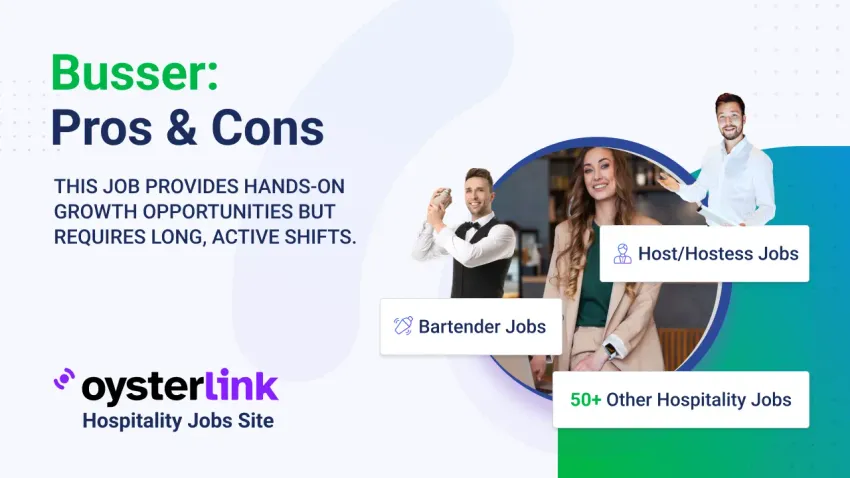A Busser helps keep dining areas clean and supports Servers to maintain smooth restaurant operations. Though the role seems simple, it’s essential and can lead to growth in the hospitality industry.
Whether you’re interested in a part-time gig or seeking an entry-level position in a busy restaurant environment, understanding the pros and cons of being a Busser can help you decide if this job is right for you.
Pros of Being a Busser
Below, we’ll break down some of the main advantages of working as a Busser, highlighting how this position can offer flexibility, hands-on experience and the potential for growth.

1. Accessible entry point into hospitality
For those with little to no experience, a Busser role offers a straightforward path into the restaurant industry. Many establishments are willing to train enthusiastic newcomers, making it ideal if you’re just starting out in hospitality.
2. Hands-on learning environment
As a Busser, you’ll quickly learn the daily flow of a restaurant. From table setup to kitchen coordination, you gain insight into how front-of-house and back-of-house operations connect. This firsthand experience can be invaluable if you aim to move into serving, bartending or management roles later.
3. Tips and supplemental income
Although Bussers often earn a base wage, many restaurants also pool tips among the staff. Depending on the establishment and tipping policies, these additional earnings can significantly boost your income — especially during busy shifts or peak dining hours.
For example, a viral TikTok shows a Busser breaking down her tip-outs for one shift, highlighting how busy nights can noticeably increase take-home pay.
4. Team-oriented atmosphere
Collaboration is essential in any dining establishment and Bussers work closely with servers, hosts, and kitchen staff. This can foster a strong sense of camaraderie and a supportive environment, especially when everyone is working toward a common goal: ensuring a great guest experience.
5. Opportunity for advancement
Many successful Servers, Hosts and even managers began their careers as Bussers. By learning the fundamentals of service, you demonstrate your reliability and gain the confidence of your supervisors — important steps for moving up in the hospitality world.
Cons of Being a Busser
Before stepping into a Busser role, it’s important to consider some of the challenges, from physical demands to irregular schedules.

1. Physically demanding work
Bussing tables requires constant movement — clearing plates, carrying trays and wiping surfaces. Extended periods of standing and walking can be taxing, especially during peak hours. If you’re not accustomed to being on your feet for long stretches, the physical aspect can be a significant adjustment.
2. Lower base pay
While tip sharing can help, a Busser’s hourly wage may be on the lower end compared to some other restaurant positions. Depending on local minimum wage laws and the establishment’s tipping structure, you might need to rely on busy shifts to boost your earnings.
3. Irregular or inconvenient hours
Restaurants often require staff to work nights, weekends and holidays — times when most people are off. If you prefer a traditional Monday-to-Friday schedule, this could conflict with personal commitments or social plans.
4. Repetitive tasks and fast pace
Clearing tables, restocking supplies and resetting dining areas can become repetitive over time. Adding to this is the fast-paced nature of the job, which can be stressful during peak dining rushes. If you thrive on variety in your daily tasks, you may find this aspect tedious.
5. Limited guest interaction
While Bussers do interact with diners — primarily when clearing tables or helping Servers — direct, meaningful customer engagement is often minimal. If you’re someone who wants to build relationships with guests or showcase product knowledge, you might be disappointed in the limited front-facing opportunities.
Typical Daily Tasks of a Busser
Bussers handle the essential behind-the-scenes work that keeps service running smoothly.
Their daily tasks include clearing and resetting tables, refilling water, running food when needed and keeping dining areas clean and organized. They also support Servers during busy shifts, helping maintain a steady flow of guests and ensuring the restaurant stays presentable.
Who Thrives as a Busser
This role is ideal for people who enjoy fast-paced, hands-on work and prefer staying active throughout their shift. Bussers who thrive are team players, quick on their feet, detail-oriented and comfortable supporting others rather than being the main point of customer contact.
It’s also a great fit for those who want to enter the hospitality industry and grow into higher front-of-house roles.

Is Being a Busser Worth It?
For many, working as a Busser is an excellent entry point into the restaurant industry. If you don’t mind physical labor, thrive in team settings and are comfortable with irregular hours, the role can provide a solid foundation.
You’ll gain practical skills, absorb restaurant operations from the ground up, and potentially move on to higher-paying positions like Server or Bartender.
On the other hand, if you prefer more predictable schedules, stronger customer engagement or a less physically demanding role, being a Busser might not be your ideal fit.
Assess your long-term career goals and personal preferences to determine whether this position aligns with your needs.
Pros & Cons of Being a Backwaiter: Key Takeaways
- Low barrier to entry: Little or no experience is often required, making it a good first job in hospitality.
- Hands-on learning: Gain insights into restaurant operations and develop teamwork skills.
- Physical demands: Expect to be on your feet, lifting and clearing tables for extended periods.
- Irregular schedule: Nights, weekends, and holidays are common working times.
- Potential for growth: Hardworking Bussers can advance to serving, bartending, or even management roles.
A Busser’s role may seem basic at first glance, but it’s an essential cog in the restaurant machine.
For those seeking an accessible entry into the hospitality industry, bussing tables offers valuable experience, a sense of teamwork and potential pathways for advancement.
By weighing these pros and cons, you can decide whether becoming a Busser aligns with your personal interests, career goals, and lifestyle preferences.











Loading comments...